- Home
- Jessie Haas
The Sixth Sense
The Sixth Sense Read online
The Sixth Sense
And Other Stories
Jessie Haas
To my parents,
with love and thanks
And thanks also to
Eileen Martin
and
Christina Major
CONTENTS
1. The Wake
2. Horse Man
3. Extended Family
4. The Sixth Sense
5. Thea
6. The Bottom Line
7. The Greyhound
8. Tanglewood
9. Winning
THE WAKE
I FIRST KNEW something was wrong by the quiet. The little brown yard within the picket fence was bare, silent, empty.
That wasn’t unusual for an early spring afternoon. It was slightly too cool for a cat to sun in comfort, and Aunt Mil herself was usually indoors, even on a warmer day. She would have heard the school bus stop at the corner, and she would be putting on the kettle, taking the gingersnaps out of the oven.
No scent of gingersnaps today, though. The kitchen windows looked blank and dark. Worry began to nip at me. Aunt Mil is old, older than my grandmother would be if she still lived. Anything could happen, and not just old age; burglars, or murderers, even …
“Use your imagination for something worthwhile!” Aunt Mil would snap, hearing any of this. I went boldly up the flagstone walk. The first crocuses were in bud, their yellow and purple heads piercing last year’s brown leaves like arrows shot from underground. Today’s job would be raking out the bulb beds.
As I opened the kitchen door I thought, Maybe she’s gone somewhere. The house behind the door seemed silent and empty, dark, and too cool.
“Aunt Mil?”
Sun streamed in the window over the sink, across the white-fuzzed cactus plants and colorful nylon pot scrubbers. “Aunt Mil?” I put my knapsack on the clean table and went toward the living room door, letting alarm in again. Oh, God, what if …
My heart gave a great frightened thump when I saw her. The house was so still and dim, I was sure it was empty. But Aunt Mil sat in her armchair before me, bolt upright; alive. I saw that at once.
Then I saw the tears, burning and carving down her face like silver acid. She sat utterly motionless, but the tears ran and dripped off her grim, straight jaw. They rooted me in my tracks. Aunt Mil, crying?
But when I looked in her lap, I knew. Curled there, fluffy and frail, was her ancient cat, Puttins, and he was much stiller than Aunt Mil.
The breath rushed out of me in a strange relief, and I started to go to her. Halfway across the rug, I began to feel like a fool. I felt awkward and miserable, and my foolish face smiled. Weird, hysterical laughter fluttered at my stomach.
“Oh, Aunt Mil!” I put one arm around her stiff shoulders. They didn’t relax. If anything, they seemed to push me away.
“Oh, Aunt Mil!” I said again. I dropped on my knees beside the chair and reached over the arm for her hand. Her hands curled around the old cat’s body, and I touched him. He was cold and unyielding, like a piece of wood covered with fur. She must have been sitting there with him a long time. I clasped her hand tightly. It was cool and slack.
Talk. Break through. “When did it happen?” I asked, and in the ensuing silence I heard how my harsh voice startled the house. Aunt Mil made no response beyond a slow, unseeing shake of the head.
I drew back to look at her. She seemed fierce, with her grim jaw and gash of a mouth, the bright, burning eyes that had never gotten old. She looked indomitable. She looked every inch the tough old battle-ax I’d always known. But …
“Aunt Mil?”
Okay, this was one for a grown-up. “I’m calling Mum,” I said, and I got up and went out to the sunny kitchen. The telephone receiver was warm, the old-fashioned dial stiff and loud.
The phone rang five times. I’ll let it go ten, I thought, but on number six Mum picked it up.
“Hello?” she said breathlessly. She would have been outdoors, looking at the new green tips of her own bulbs.
“Mum? It’s me. Uh—can you come over?”
“What’s wrong?”
“Aunt Mil—” For a second my voice squeezed off. Say it! I commanded, knowing the thoughts that would race through my mother’s mind. “Her … her cat is dead, and … she’s just sitting there. She won’t answer me.”
“I’ll be right over,” said my mother, and crashed down the receiver.
I hung up more slowly, relieved and dissatisfied. Mum would be here in ten minutes. She’d know what to do.
But I was Aunt Mil’s special relative. I was the one she liked best, the one who understood her. I was the one who knew poor old Puttins. I couldn’t say his name to Mum and rely on her to recognize it. How could Mum comfort Aunt Mil?
I heard a tearing sniff from the living room and remembered how even the most silent, unsobbing tears bring a runny nose. I picked up the box of tissues from its spot on the clean counter and went back to the living room.
The way she snatched the tissue, I knew it gave more comfort than my hug had. She dried her face before she blew her nose. I remembered the last time I cried, how the tears itched and burned like some chemical running down my face. Aunt Mil dropped the tissue on the brown rug and reached for another.
“Mum’s coming right over.”
She didn’t look at me. She was staring straight ahead. New tears came up in her eyes and started down her cheeks. She lifted the tissue to blot them, but opened it wide instead and buried her whole face, shaking silently.
I sat in the other chair and looked off out the window, embarrassed and feeling stupid. I thought of Gram’s funeral, three years ago, when I was twelve. Though Gram was her little sister, the last family member of her generation, Aunt Mil stood straight as an arrow, unshaken. Mum and my uncles clung to her, and she supported them all. Now she was shattered by the loss of a moth-eaten old cat, whom we’d known was going to die soon, anyway.…
I come two afternoons a week for house- and yardwork, and all winter I’d helped Aunt Mil fight for him. He needed special food, which he didn’t like, and we were always dreaming up ways to make it tasty and to keep him clean, free of fleas and free of colds. “If he can just make it through till spring …” she said. The most we hoped for was one last summer, a final season of sun in the garden, and a final subdued rapture in the catnip bed.
But we still lost, even after all that trying. So hard to believe that this was not just a temporary setback.
I sneaked a look at him, in Aunt Mil’s lap. How could it be that if I touched him now, he would not raise his head with a rusty trill? How could it be that he was no longer the cat we used to know?
His soul is fled, I thought experimentally, and because he wasn’t my cat, because I was pushed away by Aunt Mil’s solitary grief, I found I was excited. That sounds terrible, but since the shiny coffin that held Gram was lowered into the hole, I’ve been wondering about death. Now here it was, and how simple! How utterly strange!
Outside, a car ripped through an early-spring puddle, stopped quickly and noisily outside the picket fence. Aunt Mil’s eyes shifted around the room, and she curled her hands closer to the body of the cat. I wondered, in the remaining minute of silence, if I’d done the right thing.
Then the kitchen door opened, and Mum poured in; comfortably round, puffing a little as she struggled out of her heavy, camel-colored coat and straightened her clothes, bustling and rustling through the doorway. Aunt Mil put her chin up a quarter of an inch higher, and her mouth tightened in its downward curve. She glared at my poor bewildered mother for a minute. Then a fresh flood of tears; her face crumpled and she bent her head, pressing one hand across her eyes.
“Aunty Mil?”
It would have b
een better if Mum didn’t sound so shocked. But she rushed over and hugged Aunt Mil into her bosom. Aunt Mil collapsed there and wept loudly, with harsh, groaning sobs. My face heated. I went to look out the window at the backyard.
Like the front, it was bare and brown; neat from our work last fall, but bleak. All that showed to foretell summer’s gorgeous perennial border was a row of straw-colored stubble along the fence and the big compost pile, where all organic refuse underwent its miraculous transformation. A patch of dingy snow lingered under the forsythia, which showed as yet no sign of bloom.
As I looked, wishing I dared put my fingers in my ears, I saw Aunt Mil’s younger cat, Robert, squeeze through the pickets and tiptoe across the muddy yard. I went to the back door to let him in.
Robert arched his back in pleased surprise and stroked himself against my leg, giving me a direct, sentimental look from his yellow eyes. I scooped him up to hug. “Oh, Robert!” He was warm and sleek, vibrating with purrs and struggling with all his muscular strength to get free. He hadn’t asked to be picked up—hadn’t I noticed? But I hugged him a moment against his will, holding him like a poultice against the unexpected hurt in my heart. Poor old Putts!
Robert squirmed free and dropped to the floor with a heavy thud, still purring. I went back toward the living room. He followed slowly at first, then galloped ahead and dashed dramatically into the middle of the rug.
Aunt Mil was sitting up straight again, blowing her nose. Mum perched on the arm of the chair, one plump, warm arm around Aunt Mil’s shoulders.
“Kris can do it,” she was saying, “if you have a shovel.”
Oh, God, Mum!
Aunt Mil brought the blasted tissue down from her face and saw Robert taking his buccaneer stance in the center of the rug. More tears—where are they coming from?—poured down her cheeks. She bent forward over the dead cat in her lap and snapped her fingers.
Like a buccaneer deciding it might not be a trap, Robert swaggered over, keeping one eye on Mum. He rubbed his chin hard, once, on Aunt Mil’s fingers. Then his yellow eyes flashed beyond, to the cat in her lap.
There had existed between Puttins and Robert a kind of armed neutrality, tested from time to time. Each was jealous of the other. If Robert was playing with a piece of string and Puttins tapped it, even once, then no amount of coaxing would lure Robert back to the game for at least twenty minutes. They never shared a lap, so unless I was there, one of them would always be curled in a chair across the room from Aunt Mil, giving her the cold shoulder. Usually it was Robert.
Now, when his hot yellow glare found Puttins, I expected him to turn away in an ostentatious miff. Instead, he stood where he was, lifting his nose in tiny bobbing motions to test the scent. He knows, I thought. Aunt Mil’s eyes dried as she watched him, and even Mum saw something going on, and was silent.
Robert minced forward. Aunt Mil leaned slowly back, so that the old cat showed plainly on her lap. When he was close, Robert reared on his hind legs, placing one paw delicately and weightlessly on Aunt Mil’s thigh for balance. He stretched his neck to its utmost limit and smelled the tips of Puttins’s dull old hairs, bobbing his nose along them. His eyes glared beyond, into space. His ears were wild.
At the end of this long moment he sank slowly down to a sitting position and stayed there, thinking. We all watched him, still, as if we awaited some pronouncement. Eventually Robert stalked a little way off and lay down, ears back; definitely thinking. What he thought would never be revealed, and I think we all sighed.
In the silence Mum sighed again, looking at the four of us: old aunt, teenage daughter, dead cat, live cat. How was she going to tidy all this up and get home in time to make supper?
“Aunty Mil,” she asked at last, hesitantly. “What do you want?”
Aunt Mil’s face twisted for a second. What a stupid thing to ask, I thought. She wants him back!
Mum went on. “We can … bury him now, if you want, Kris and I. Or if you’d rather wait, I’ll take you home to supper with me.”
The expediency, mingled with her kindness, made me ashamed—but at least she was doing something, taking charge. Maybe I did understand Aunt Mil a little better, but I was useless.
Watching Robert, Aunt Mil had gone quite a way back toward normal, so I wasn’t surprised when she finally spoke. “Thank you, Grace, but I’ll do it myself. Later. I’ll come to dinner with you now.”
At home, Mum went to work in the kitchen, and Aunt Mil helped, slicing vegetables and setting the table. Outwardly she seemed all right, but I felt her quiet and saw how she was bowed down, darkened and diminished. Mum chattered; Aunt Mil answered. Feeling superfluous, I went to my room to do homework. Homework, on a Friday afternoon!
When supper preparations were over, I heard the television come on. Time for Mum’s favorite game show. Aunt Mil was plunked down on the couch to watch too. She despises game shows. Mum doesn’t know this, of course. Amiably she was trying to amuse and distract Aunt Mil, feeling it was the right thing to do.
Should I go down and rescue her? Bring her up to my room for a little rational conversation? That’s what she says when we bump into each other at a gathering of relatives. “Now, for a little rational conversation!”
But before, when we had rational conversation, it was about books and old movies, compost, plant propagation, and interspecies relations. Before, I had never seen Aunt Mil shattered, nor heard her sob. I stayed where I was, doing math problems that all came out wrong.
Greg and Amy came home on the late bus, full of news. Supper started to smell good. Then Dad came home. The house changed from a relaxed, boring place to a boring place humming with Standards, Expectations, and Responsibilities.
“What are you doing, Kris?” he asked outside my door.
“Math.”
“Good!” He was surprised. On the other side of the wall beside my desk, I heard Amy give an irritated tsk. She was only changing. Dad said she spent too much time on her appearance. True enough, actually.
Mum came rustling and puffing up the stairs, following Dad into their bedroom. I decided to go down and be with Aunt Mil and stepped out into the hall where I could hear everything.
“… never seen her go to pieces like that. She seems all right now, but she cried so, Steve!”
Dad made a noise that might have been concerned and sympathetic. Then he said, “Foolish to waste all that emotional energy on an animal!”
“They’re all she has!”
“Why doesn’t she go to the Senior Center, or spend time with the family?”
“Shh, Steve!”
“Well, it’s silly!”
“Yes, I know. I thought I’d send Kris to spend the night with her.”
Their footsteps were starting to leave the room. I closed my door sharply and headed downstairs.
Spend the night?
Normally I love to, because face it, Aunt Mil is my best friend. We drink a lot of tea and eat cookies, crackers and cheese, or popcorn. We have rational conversations or find a Leslie Howard movie on late, late TV. We make laps for the cats.
She still sat on the couch, apparently watching the news. I sat, too, facing halfway between her and the TV, ready to be there if she spoke.
She neither spoke nor looked. She kept her straight, unwinking gaze on the television set, even through commercials. By not one gesture did she acknowledge our special kinship.
I looked down at my empty lap. I wish I had a cat. We have no animals in our house, except a pair of goldfish that serve a decorative function. That’s why our house is so boring.
I think people need animals, and I have some theories why. The middle part of our brain, the one that handles emotions, is the same structure shared by all mammals; we’ve just added something more. Therefore I think we understand all mammals—or would if we would allow ourselves. To see an animal is to see an inner part of us, before it was hidden and hampered by our intellect. Little kids love animals, and fairy tales are full of them. Also, they’re
more beautiful than us. When you consider all this, and you consider how boring this house is, with only people and goldfish, then you have to consider that my father is wrong.
Wrong or not, he now came brisk and hearty into the room and went to the bar to mix himself a drink. While he did, he talked cheerfully to Aunt Mil about a wonderful seventy-year-old man he’d met last week, who went to the Senior Center every day and had a tremendous lot of fun playing Bingo. The corner of Aunt Mil’s mouth compressed in a bitter smile. She asked him to mix her a drink, too, and he did, looking surprised.
It was a clear, cold gin and tonic. Watching the thirsty way she gulped it, I was reminded that alcohol is a drug. Aunt Mil doesn’t take it often. “I’m hoarding the few brain cells I have left to me,” she likes to say. She also says that alcohol is a depressant, so why she was drinking it now, I didn’t know.
When we’d watched the newscast right through to sports and weather, it was time to eat. Over supper, we heard what Greg and Amy did in school—again. We heard a little of what Mum did in school, where she teaches the morning kindergarten class. We heard a lot about what Dad did in school, where he teaches high-school chemistry. I have to take his class next year, and frankly I don’t look forward to it.
We heard nothing of Aunt Mil’s cat, companion of fifteen years, dying in her lap that very afternoon.
Aunt Mil had a poor appetite. Mum kept coaxing her to eat, as if that would solve something. Dad tried to draw her out on subjects like Motivating Students in the Sciences, and The Graying of America. She made him short answers which ended with periods. She had great, if searing, things to think about, and all this chatter kept her from them.
Supper was done. Dishes were washed. Over coffee, after a decent interval, Aunt Mil asked to go home.
Mum fluttered and protested, clearly showing that she thought it a morbid impulse. “At least take Kris,” she said. “You shouldn’t be alone.”
Aunt Mil’s eyes swung to look at me. They were tired but personal. They saw me, not a commodity to ward off loneliness.

 Chase
Chase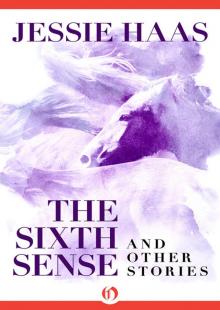 The Sixth Sense
The Sixth Sense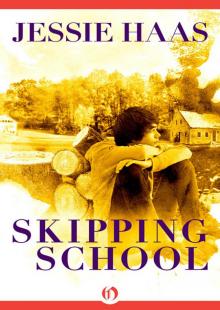 Skipping School
Skipping School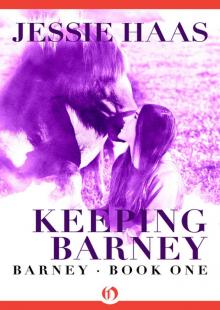 Keeping Barney
Keeping Barney Unbroken
Unbroken Westminster West
Westminster West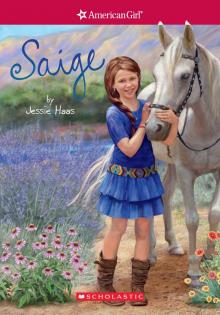 Saige
Saige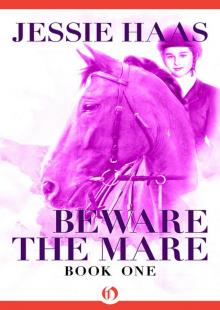 Beware the Mare
Beware the Mare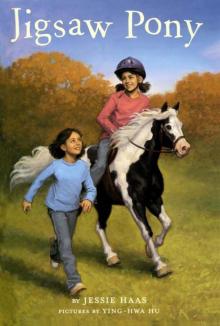 Jigsaw Pony
Jigsaw Pony Rescue
Rescue Saige Paints the Sky
Saige Paints the Sky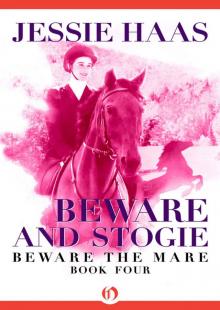 Beware and Stogie
Beware and Stogie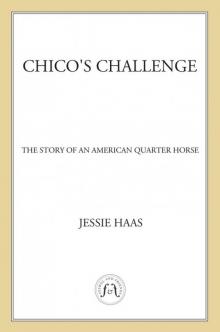 Chico's Challenge
Chico's Challenge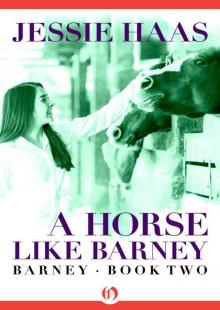 A Horse like Barney
A Horse like Barney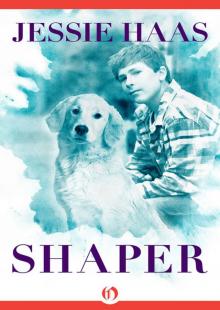 Shaper
Shaper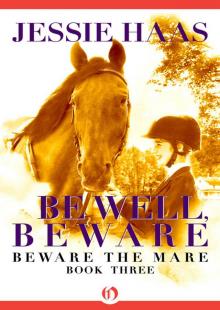 Be Well, Beware
Be Well, Beware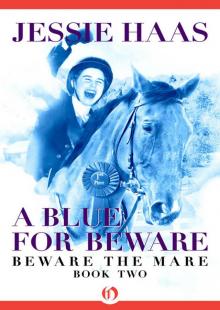 A Blue for Beware
A Blue for Beware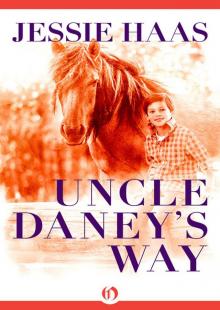 Uncle Daney's Way
Uncle Daney's Way